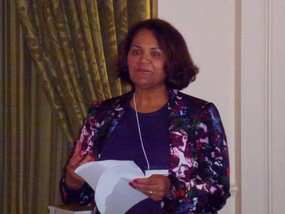COL Welcome address
Welcome message to the OER Symposium
Frances Ferreira, Education Specialist, Open Schooling
Commonwealth of Learning (COL)
6 June 2013

70 % of the participants are from Kenya representing different institutions as well as representatives from the MoE .COL values Networking and partnerships as excellent strategies that help to build confidence and to learn from each other instead of duplicating efforts. It is for this very reason that COL has invited strategic partners such as UNESCO .OER Africa ,SADC CDE as well as a representative from OERU , who is our facilitator for this symposium, to strengthen our efforts regarding OER. Furthermore ,COL launched the Commonwealth Open Schooling Association in 2010 after broad consultations with Commonwealth countries. The basic objective of COMOSA is to cooperate and collaborate in the development, promotion and introduction of innovative, high quality, relevant, equitable, gender-sensitive and cost-effective programs, of school education for sustainable development in Commonwealth countries through Open and Distance Learning Mode to achieve the United Nations Millennium Development Goals (MDG), (COMOSA Constitution, 2010).
Last year in Seychelles, this Association adopted its OER & Copyright policy. While planning for this symposium we purposely invited COMOSA members from Tanzania, Zambia, Ghana, Namibia, Botswana, India and Bangladesh to add value to the symposium as well as to assist these countries and institutions to develop and implement their institutional OER & Copyright policies. This will be a direct outcome from this symposium. Allow me therefore to extend a warm welcome to our Strategic as well as COMOSA partners. The most recent report on the MDG indicates that 61 million children of primary school age and 71 million children of lower secondary school age were out of school in 2010 (UIS, 2012[1]). While significant progress has been made in achieving Universal Primary Education, according to statistics, 31.2 million left before completing the primary school cycle and 32.2 million repeated a grade in primary school (UIS, 2012). In my view these statistics are tragic because these children were given access and yet the countries did not succeed in translating this into real educational gains. Furthermore, funds that were invested into the repeaters could have been used for those who were still out of school if the repeaters were successful in the first instance. Of the 61 million who were out of primary school, it is projected that 47% will probably never enter school, 27% may enter school in future, while 26% attended school but dropped out. It is estimated that more than half of the 61 million are girls. Sub Saharan Africa (SSA) has the highest drop-out rates of any region in the world and most early school leaving occurred between grades 1 and 2. It is reported that 17% (about one in six learners) leave school before grade 2 (UIS, 2012).
Education is a basic human right. Denying children the right to education or giving up on strategies to address this challenge is not acceptable when there are solutions. These are worrying statistics and it is clear that all efforts should be made to deal with this challenge as education is central in reducing poverty and providing citizens with knowledge and skills to lead healthy and productive lives. It is evident that this challenge needs a collective effort and every possible strategy. So what does this have to do with the symposium on OER? Some of the reasons for these statistics are lack of learning resources, textbooks, unqualified teachers and poverty. Although Open Educational Resources are not a panacea for this, it is definitely ONE strategy that can assist in dealing with this challenge. However, despite the success of OER and the evidence that OER can make a difference, we find a very slow pace of adopting OER. One of the reasons being is that there is not an enabling environment in institutions and in countries to allow the adoption and roll out of OER. That is why we are here.
During this OER Symposium we will consider strategic opportunities and barriers for OER in Kenya and the region taking into account our COMOSA members from Asia. We hope that Participants’ knowledge and understanding of the potential of OER for promoting access and quality will be enhanced and that there will be an increased awareness of the contexts, rationale and processes of OER policy development.
To achieve this, the symposium will explore policy enablers and practices for harnessing the potential of open education approaches for the benefit of the formal education sector in Kenya and the region. To ensure that it does not end with the symposium, a very important aim is to commence work on open proposals for action, building on existing foundations and achievements to planning the way forward for a sector wide response to open education in Kenya and the Region with specific plans for OER institutional policy development and implementation.
I am excited to participate in this symposium and to make a contribution to development of institutional policies which will, when implemented, make a difference in the plight of out of school students through the adoption and roll out of OER. Once again a warm welcome to the symposium.
Reference
- ↑ UNESCO Institute for Statistics. (2012). Global Education Digest 2012 Opportunities Lost:The impact of grade repitition and early school leaving. Montreal: UNESCO Institute for Statistics.
